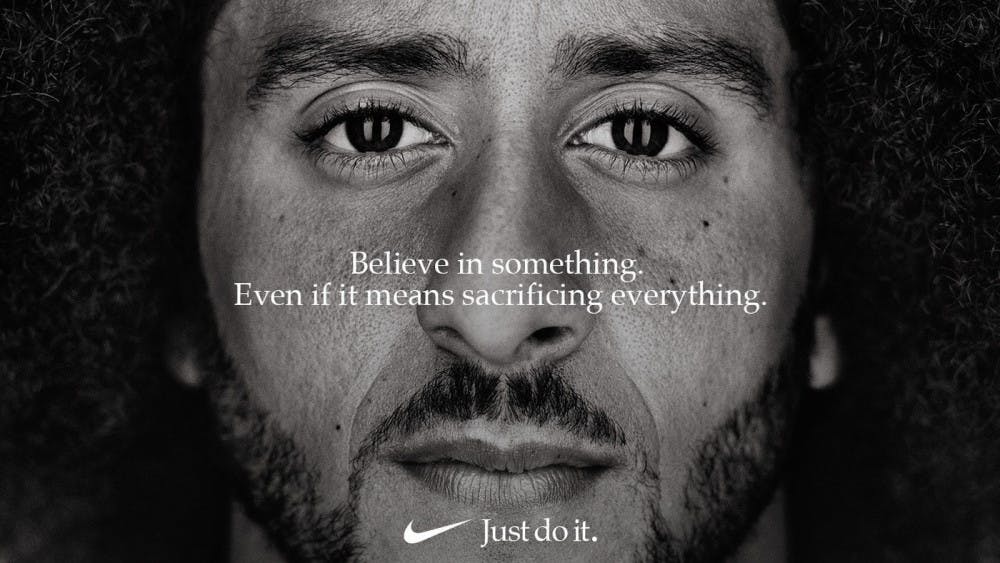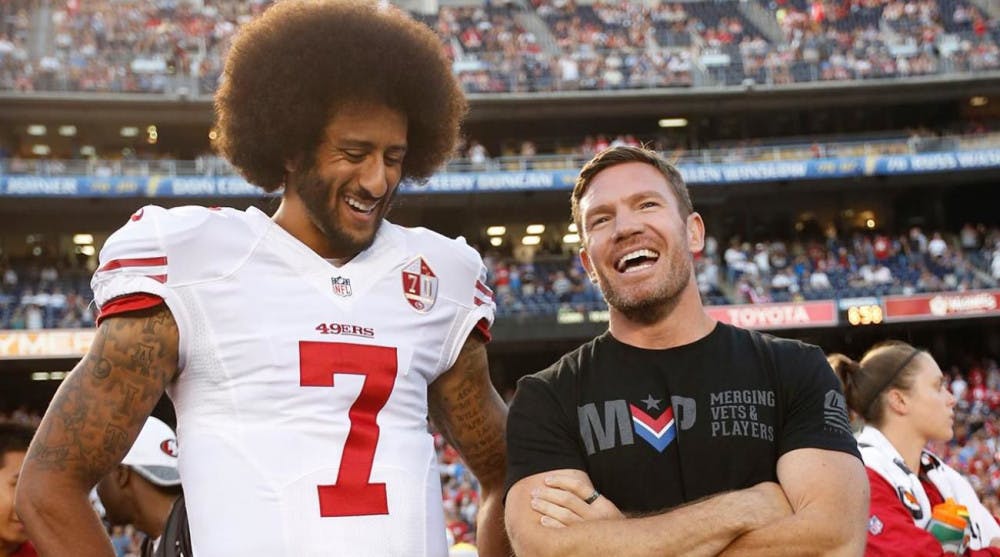
Colin Kaepernick is the face of Nike's 30th anniversary "Just Do It" campaign, sparking controversy in the United States.
In response to Nike’s 30th anniversary Just Do It campaign starring Colin Kaepernick, people are burning their apparel that belongs to the brand. The campaign surrounded the slogan “Believe in something, even if it means sacrificing everything” - a reference to Kaepernick’s career.
During the San Francisco 49ers third preseason game of 2016, Kaepernick sat down during the national anthem. After the game, Kaepernick said in an interview that he was, “not going to stand up to show pride in a flag or a country that supports the oppression of black people or people of color,” according to the National Football League (NFL).
By the next preseason game, he opted to kneel to show more respect for former and current U.S. military members. The idea came from former football player and U.S. military veteran Nate Boyer.

Kaepernick and Nate Boyer, the former NFL player and U.S. military veteran who encouraged him to take a knee instead of sit during the national anthem.
The practice of kneeling during the anthem proved to be divisive with President Donald Trump characterizing it as disrespectful to the U.S. flag and military.
Shortly after, Kaepernick’s jersey sales skyrocketed while he was also determined 2016’s most disliked player, according to ESPN. The 2016 NFL also had a significant drop in their television ratings, due to people boycotting the NFL after Kaepernick’s actions.
Immediately after Nike made Kaepernick the face of their campaign, backlash began. John Rich, of the country duo Big & Rich, tweeted a picture of the band’s sound man holding the famous Nike swooshes cut off his socks.
Our Soundman just cut the Nike swoosh off his socks. Former marine. Get ready @Nike multiply that by the millions. pic.twitter.com/h8kj6RXe7j
— John Rich (@johnrich) September 3, 2018
Rich’s tweet ended up going viral, following Twitter user Sean Clancy’s video of him burning his Nike shoes. The video led to the hashtag #BurnYourNikes, subsequently resulting in a trend where conservatives light their Nike gear on fire.
First the @NFL forces me to choose between my favorite sport and my country. I chose country. Then @Nike forces me to choose between my favorite shoes and my country. Since when did the American Flag and the National Anthem become offensive? pic.twitter.com/4CVQdTHUH4
— Sean Clancy (@sclancy79) September 3, 2018


The importance of this conversation around Nike destruction and its relative merit is this boycott isn’t just about the brand. Destroying their Nike attire allows these people to voice their displeasure with Nike, and to assert their own identity in a public space.
This identity that’s being shown is nothing other than underlying racism. It’s a well known fact that Kaepernick’s protest is in response to the racism and police brutality against people of color. When people criticize that protest, they are basically shaking hands with racism itself.
What people fail to realize is Nike’s sales have gone up 31 percent from this campaign, according to Time - something that was closely considered before even making the final decision on making Kaepernick the face of the campaign. By giving the company media attention, those who are shunning Nike are also courting the brand’s media performance.
Nike knew exactly what they were doing when they decided to highlight Kaepernick’s career. The risk of a negative response was most obviously assessed and considered before making the deal, which implies Nike believed they would earn more than they would lose with the sponsorship.
Another thing to consider is whatever compels someone to burn their Nikes is the same thing that compels someone to go out and buy something from the brand. Regardless, Nike is still making money, because they’ve already profited off what protesters have purchased.
Nike is also going to make a profit off social justice and the desire to do something for a cause. Millennials and Gen Z's, the demographic that is the company’s future, are more likely to choose companies that have a social theme as a core value.
At the end of the day, you can burn your shoes or cut off that famous swoosh. Nike still got your money.









